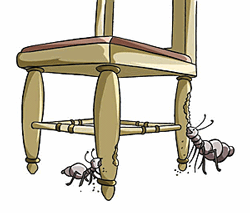phago-, phag-, -phage, -phagi, -phagic, -phagically, -phagia, -phagism, -phagist, -phagic, -phagous, -phagy
(Greek: eat, eating; to consume, to ingest; relationship to eating or consumption by ingestion or engulfing)
tecnophagia, tecnophagous, tecnophagy
A reference to species that eat their own eggs.
telmophagous, telmophage
1. A reference to an organism, usually an insect, that feeds from a blood pool produced by tissue laceration.
2. A blood-sucking insect that feeds from a blood pool produced by laceration of blood vessels; also known as, "pool feeders".
2. A blood-sucking insect that feeds from a blood pool produced by laceration of blood vessels; also known as, "pool feeders".
The practice of eating a godlike person or something representing a god.
1. The eating of God (in the mass or communion rite).
2. In anthropology, the eating of meals at which the participants believe that they ingest a deity with the consecrated food.
2. In anthropology, the eating of meals at which the participants believe that they ingest a deity with the consecrated food.
theophagous (adjective)
The practice of ingesting a god: "The theophagous term most likely came from the ancient habit of eating a sacred animal to secure a blessing, a grace, and an identity with the deity."
1. The practice or ritual eating of a god, or of the thing symbolizing god, such as a sacrament.
2. The eating of God (in the mass or communion rite); the communion.
3. In anthropology, the eating of meals at which the participants believe that they are ingesting a deity as part of the consecrated food.
2. The eating of God (in the mass or communion rite); the communion.
3. In anthropology, the eating of meals at which the participants believe that they are ingesting a deity as part of the consecrated food.
thermophagy
1. The consumption (eating) of cooked-hot food.
2. The habit of swallowing very hot food.
3. A craving for very hot food.
2. The habit of swallowing very hot food.
3. A craving for very hot food.
tracheosophageal
Relating to the trachea and the esophagus.
The practice, or habit, of biting or eating hair or wool.
vermiphagia
Eating worms.
xerophagia
1. The eating of dry foodstuffs; subsisting on a dry diet.
2. A diet of bread and water.
2. A diet of bread and water.
Actually, xerophagy refers to a type of religious fast in which the jejunator [the person who fasts] consumes only bread, salt, unseasoned vegetables, and water. It’s strange that a word element [xero] which means “dry”, includes water.
xerophagy
The habitual eating of dry or desiccated (thoroughly dried out) food.
xylophagan
Names in different classifications for various groups of insects whose larvae devour wood.
An insect belonging to one of these groups.
xylophage
A wood-eating insect.
xylophagist
1. Organisms which eat wood; those thriving on wood as a source of food; such as, certain molluscs, insects, and fungi.
2. Eating or boring into wood, as the larvae of certain insects.

These eager xylophagous insects are showing us just what xylophagy is all about.
2. Eating or boring into wood, as the larvae of certain insects.

Related "eat, eating" word units: brycho-; esculent-; esophago-; glutto-; vor-.
Cross references of word families that are related directly, or indirectly, to: "food, nutrition, nourishment": alimento-; broma-; carno-; cibo-; esculent-; sitio-; tropho-; Eating Crawling Snacks; Eating: Carnivorous-Plant "Pets"; Eating: Folivory or Leaf Eaters; Eating: Omnivorous.


